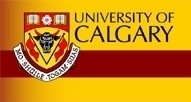Faculty of Engineering
Faculty Information
Contact Information
Location | Engineering Block C204 |
Student Information | (403) 220-5732 |
Web page URL |
Introduction
The Faculty of Engineering at the University of Calgary was established in 1965. The degrees awarded by the Faculty since its inception have been recognized by the Canadian Engineering Accreditation Board. The engineering curriculum consists of a well-balanced mixture of traditional topics in engineering sciences and specialization in subjects relevant to current industrial practice. The academic staff, as well as the students, of the Faculty of Engineering come from all parts of the world, giving the Faculty its uniquely friendly and international atmosphere. | |
Enquiries | Enquiries regarding admission, registration, interpretation of regulations, or any matter regarding undergraduate studies in Engineering should be directed to the Office of Undergraduate Studies, Faculty of Engineering, Room EN-C204, Telephone 220-5732. Students and prospective students are invited to view pertinent information available through the engineering website, www.eng.ucalgary.ca. |
Pattern
Admission to the Faculty of Engineering normally takes one of two forms: (1) students are admitted to the first year of the program directly from high school; (2) students are admitted to the first year or second year of the program after having received advanced credits from another University of Calgary faculty or from another post-secondary institution. The first year of the Engineering program is common to all students. In April of the first year of study, students apply for admission to a discipline: Chemical, Civil, Computer, Electrical, Geomatics, Manufacturing, Mechanical, Oil & Gas, or Software Engineering. During second year, students not only complete courses common for all disciplines, but also courses specific to their chosen discipline. In the third year students take specialized courses in their chosen discipline. At the end of third year students at their option may enroll in the Engineering Internship Program (EIP); this program consists of 12 to 16 months of work in an industry setting where students gain valuable practical engineering experience (see Engineering Internship Program, later in the Engineering section of this Calendar). This academic program is available to all students. In some disciplines during the fourth year of study (fifth year for Internship enrollees) students have the option to take a minor specialization in one of several areas. In addition to the technical requirements, students take complementary studies courses in non-Engineering and non-Science subjects as an integral component of an Engineering education. This pattern is somewhat different for students who enroll in a combined degree program with one of the Faculties of Humanities or Social Sciences. (See Combined Programs, later in the Engineering section of this Calendar.) |
Opportunities
To practice engineering in Canada as a professional (P.Eng.) one must be registered (licensed) with the professional engineering association of the province or territory in which one practices. All BSc degrees offered by the Faculty of Engineering are accredited by the Canadian Engineering Accreditation Board (CEAB) of the Canadian Council of Professional Engineers, a federation of the 12 professional engineering associations in Canada which registers and licenses engineers. Students graduating from these programs fulfill the academic requirements for registration as Professional Engineers with the province or territory where they choose to practice. |
Student Affairs
Engineering Students' Society | The Engineering Students' Society (ESS) is an organization affiliated with the Association of Professional Engineers, Geologists and Geophysicists of Alberta. The ESS provides a social atmosphere for engineering students and, in addition, acquaints them with the professional and technical responsibilities of the profession. It is expected that all Engineering students will join the Society, participate in its activities and promote its interests. By majority vote of the engineering-student population, in 1995 the Engineering Students' Society established the Calgary Engineering Endowment. A $25.00 per session optional levy is included in the tuition of every engineering undergraduate student. Interest from the endowment is used to purchase equipment for the undergraduate laboratories. The funds are distributed by the Endowment Board of Directors whose membership consists of a majority of undergraduate students. Proposals are requested in March of each year. |
Resources
Computers in Engineering | All engineering disciplines make extensive use of computers. Accordingly, microcomputers are used throughout the undergraduate curriculum. The faculty has a number of computer laboratories for use by undergraduates. Nevertheless, for the convenience of the student and to reduce load on the laboratories, students entering engineering are encouraged, but not required, to purchase a microcomputer for use throughout their academic careers. For guidance, note that the vast majority of machines in use in the Faculty of Engineering are Pentium III or 4 based machines that can be booted to run either a recent Microsoft Windows operating system or a recent version of the Linux operating system. In many cases software is made available at low cost through University licenses. Other software purchases may be suggested by instructors in individual courses. |

